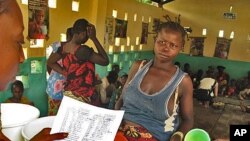A report on hunger released this week highlights the persistent difficulties Africans face regarding food security.
In the list of 10 countries facing the worst levels of hunger, nine of them are in sub-Saharan Africa. According to the annual Global Hunger Index, the only non-African country on the list is Haiti. The nine African countries are the Democratic Republic of Congo, Burundi, Eritrea, Chad, Ethiopia, Sierra Leone, Comoros, Madagascar and the Central African Republic.
In the Democratic Republic of Congo, three quarters of the population are estimated to be undernourished.
The International Food Policy Research Institute, which released the report with other aid groups, says economic growth, strong agricultural performance, gender equity and an end to conflict are essential to substantially reducing hunger.
A senior fellow at the Chicago Council on Global Affairs, Roger Thurow, has many more practical ideas. He explains the title of his recently co-authored book, "Enough."
"We brought hunger with us into the 21st century in ever increasing numbers and that is shameful. We ought to say we have enough with the hunger issue; let us get to the bottom of it. The other meaning is that there is enough food in the world to feed everybody, for everybody to have enough caloric intake to lead an active life," he said.
A key problem in Africa, Thurow says, is that farmers are usually left to fend for themselves when they face a drought, a flood or an insufficient harvest.
"In the United States or in Europe when a crop fails, there is usually somebody who writes a check either the government or an insurance company. In Africa, when a crop fails, people die because there is no safetynet. Nobody is sharing the risk; it is all borne by the farmers themselves."
Although emergency relief is crucial in times of famine, Thurow would like to see more aid for long-term agricultural development and practices, such as improved grain storage.
"In Africa, maybe 30 to 50 percent of harvests of the various crops are wasted every year because there are not proper storage facilities. The markets then should be able to steer some of the surpluses in one part of the country to other places where there are shortages," he said.
Thurow calls for more micro-finance programs to give African farmers the ability to buy seed and fertilizer, and to improve irrigation. He says he is encouraged by mobile phone applications that are being developed to give farmers data on prices and marketing possibilities.
Earlier this year, activists with the international anti-poverty group ActionAid held marches in several countries, calling for an end to hunger.
The group's chief executive Joanna Kerr says farmer and female empowerment are crucial.
"The solution is quite simply -- to put farmers first and particularly female farmers first. Women farmers produce 80 percent of the world's food and they produce that food closest to where people are the hungriest," she said.
Kerr says world leaders need to do much more to confront the problem.














